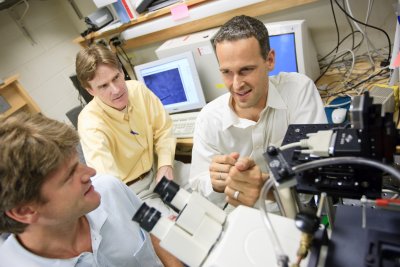Redox in Molecular Signaling
Participants: Furdui, Guthold, Hantgan, Kim-Shapiro, Loeser, Macosko, Miller, McCauley, Muday, Poole, Scarpinato
Questions: Signals induced by physical forces acting in and around cells, as opposed to signals induced by chemical molecules, have been termed mechanical signaling or mechanobiological signaling. Mechanical signaling often starts with integrin proteins at cell surfaces, and it is often transmitted by the fibers of the cytoskeleton or the fibers of the extracellular matrix.

Researchers in this group focus on mechanically-induced molecular responses by anti-clotting drugs (integrin signaling), mechanical properties of nanofibers involved in signaling, characterization of of transport within cells, alteration of DNA structure by chemotherapeutics and DNA-protein assemblies, signaling resulting from mechanoperception of the gravity vector, and the interactions between mechanical stress and hormone signals linked to osteoarthritis.
Technology: Participants use atomic force microscopy (AFM) for mechanical force and single molecule imaging, electron paramagnetic resonance spectroscopy, surface plasmon resonance spectroscopy, and laser scanning confocal microscopy. Most of these instruments are in place, however some of them are aging and in need of replacement. In particular, Guthold applied for an NIH S10 instrumentation grant, requesting a new combined AFM/confocal microscope set-up ($495,000, not funded), and larger Center participation in the project would strengthen this application for resubmission. This group is also engaged in developing new instrumental approaches, such as MEDIC imaging, molecular recognition technologies and AFM-based manipulation techniques.
Emphasis Group Activities: This group is closely associated with the SCB seminar series and graduate training program. Under Guthold’s guidance a new monthly forum on mechanobiological signaling will be established to share ideas and approaches within this group. Activities of this subgroup are organized by Martin Guthold.
Implications: Mechanobiological signaling is an emerging field, although this type of signaling may be as important as chemical signaling. For example, mechanical signaling has a critical influence on cell development and differentiation, such that cells grown on soft matrices (mimicking brain tissue) tend to grow into neural cells, while cells grown on stiffer matrices grow into muscle cell precursors, and hard matrices yield bone.
